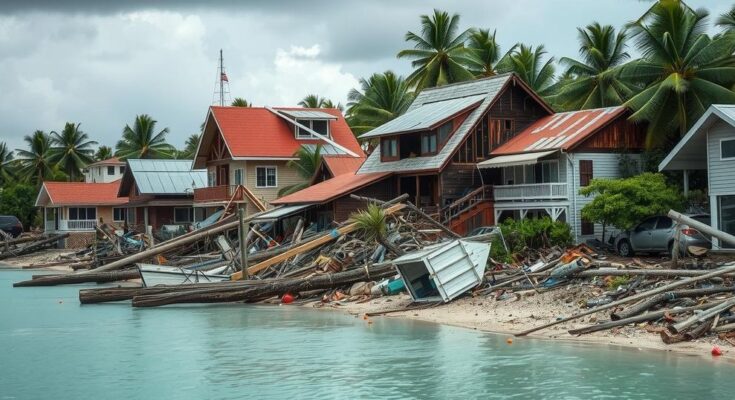Cyclone Chido has devastated Mayotte, leading to fears of thousands of fatalities. Official reports indicate 14 confirmed deaths. Infrastructure damage complicates rescue operations, with military aid being the primary support for the affected population of around 300,000 residents. The cyclonic storm has also highlighted ongoing issues related to poverty and climate change in the region.
Rescue operations commenced on Monday in response to the catastrophic impact of Cyclone Chido on Mayotte, a remote French overseas territory in the Indian Ocean. The storm, which is deemed the most destructive to affect the region in nearly a century, has left authorities concerned about a death toll that could reach into the thousands. As of the latest reports, 14 fatalities have been confirmed, but officials speculate that the number may significantly increase given the densely populated nature of the territory, home to approximately 300,000 residents.
French officials reported extensive devastation across various neighborhoods, particularly in areas characterized by poorly constructed slum settlements. Infrastructure essential for transportation, including the main airport and hospitals, has sustained severe damage, complicating rescue operations significantly. Currently, only military aircraft are able to land on the islands following damage to the airport’s control tower, and widespread power outages have occurred throughout the archipelago.
In an effort to assist recovery efforts, France has dispatched rescue workers, soldiers, medical personnel, and supplies, alongside aid from the nearby territory of Reunion. Mayotte, recognized as the poorest territory within the European Union, continues to attract economic migrants from surrounding regions, thereby highlighting the need for effective rescue and recovery efforts following the cyclone’s destruction. According to the French Red Cross, approximately 100,000 individuals resided in makeshift slum dwellings prior to the storm, many of which have been completely obliterated by Cyclone Chido.
Cyclone season in the southwestern Indian Ocean commenced at the beginning of December, with Cyclone Chido categorically classified as an intense tropical cyclone, comparable to a category-4 hurricane. Chido lashed out at Mayotte on Saturday before making landfall in the larger island nation of Madagascar due to its southward trajectory late Sunday. It has been suggested that the intensification of such cyclones may be linked to climate change, leading to more frequent extreme weather patterns fueled by warmer air and seawater conditions.
Mayotte is a French overseas territory located in the Indian Ocean, characterized by a significant population density and prevalent poverty. The cyclone season in this region runs from December through April, with recent years showing an alarming trend of intensifying storms. Cyclone Chido is notable as it has caused unprecedented damage to communities, particularly in slum areas that lack robust infrastructure. The ongoing challenges of economic migration and climate change further complicate the situation, emphasizing the need for comprehensive disaster response strategies.
Cyclone Chido has wreaked unprecedented havoc on the French territory of Mayotte, leading hundreds, if not thousands, to fear for their lives. The loss of life, destruction of infrastructure, and displacement of residents highlight the devastating impact of such natural disasters. As rescue efforts continue, the situation also raises critical questions regarding the influence of climate change on storm intensity and the necessity of improved disaster preparedness in vulnerable regions.
Original Source: www.cbsnews.com




